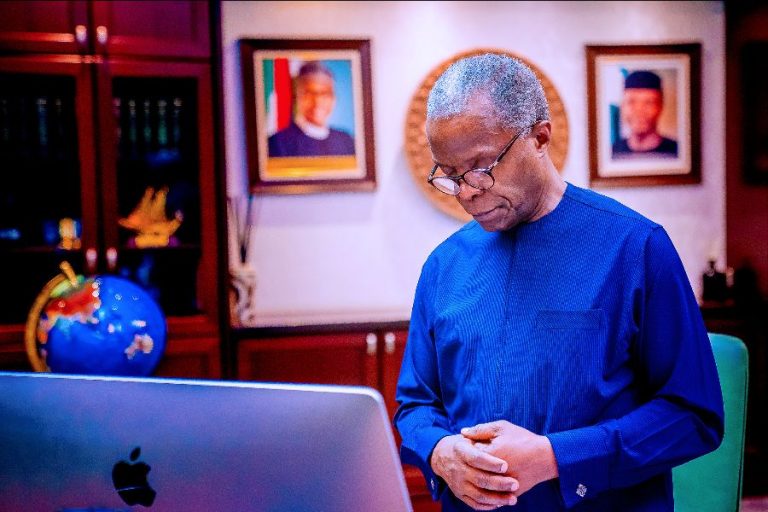As part of efforts to boost the nation’s revenue and the tax to GDP ratio, Nigeria’s Vice President Yemi Osinbajo, said the Federal Government has no plans to raise tax rates immediately but will utilize legal provisions that allow it impose taxes on profits made in the country by global technology and digital firms not based in the country, but with significant economic presence.
According to Laolu Akande, Senior Special Assistant to the President on Media & Publicity, Office of the Vice President, on Sunday, Osinbajo said the Finance Act 2019 already empowers the government to widen the tax net by collecting taxes on the Nigerian income of the global tech giants, even if they have no physical presence.
Interacting with a visiting delegation of the Chartered Institute of Taxation of Nigeria, CITN, led by its President, Adesina Adedayo at the Presidential Villa on Friday, Osinbajo said Section 4 of the Finance Act 2019, Osinbajo said steps have been taken regarding technology companies with no physical presence, but who do big business in the country.
The Finance Act, he said, “has shown that we are very prepared to ensure that these big technology companies do not escape without paying their fair share of taxation in Nigeria. Many of them do incredible volumes here in Nigeria and in several other parts of the region.
It provides that “the Minister (Finance) may by order (of the President) determine what constitutes the significant economic presence of a company other than a Nigerian company.”
The Act prescribes Zero Company Income Tax (CIT) for companies with less than N25m in annual turnover, while those with revenues between N25m and N100m (categorized as “medium-sized” companies) had their rates cut from 30% to 20%, while Nigerians making minimum wage income are tax exempt.
The Vice President lamented that the nation has “had severe economic downturns which of course implies that we may not be able to collect taxes with the aggressiveness that would ordinarily be expected.
“I think the most important thing is that we must widen our tax net so that more people who are eligible to pay tax are paying. Several efforts have been made, and I am sure you are aware of the initiatives including the Voluntary Assets and Income Declaration Scheme (VAIDS) which was also an attempt to bring more people into the tax net, including those who have foreign assets.”
“We have drawn up the regulations and we are prepared to go, and I think that we are at least in a good place to tap into some of the tax resources we can get from some of these companies,” he told his visitors.
He noted that Nigeria is not doing anything strange going by recent news reports about how governments across the globe are “grappling with how to modernize their legal frameworks to account for the global reach of the digital economy, reshaping how policymakers think about issues as varied as monopoly power, taxation and workers’ rights.”
The statement by Akande quoted the Finance Act 2019 as noting that a company will pay taxes if it “transmits, emits or receives signals, sounds, messages, images or data of any kind by cable, radio, electromagnetic systems, or any other electronic or wireless apparatus to Nigeria in respect of any activity, including electronic commerce, application store, high-frequency trading, electronic data storage, online adverts, participative network platform, online payments and so on, to the extent that the company has significant economic presence in Nigeria and profit can be attributable to such activity.
“If the trade or business comprises the furnishing of technical, management, consultancy or professional services outside of Nigeria to a person resident in Nigeria to the extent that the company has significant economic presence in Nigeria”
Speaking further on the decision to retain current tax rates despite arguments of Nigeria’s very low tax rates, compared to some other climes, Osinbajo admitted that “higher tax rates can be a disincentive to businesses and investments.
“In terms of domestic resource mobilization, we are trying to do the best we can given the present circumstances and I believe that there is room for improvement,” he stressed.
Speaking earlier, Adedayo, the CITN President, said the visit became necessary given the enormous work done by the Buhari administration to address the country’s huge fiscal challenges, public financing reforms, and sustained efforts towards addressing infrastructural deficit across the country.
In his words, “it is important that we sustain measures already being implemented to improve tax collection at all levels.”
The CITN boss was accompanied by the institute’s Vice President, Barrister Samuel Olushola Agbeluyi, past Presidents, Dame Gladys Simplice, and Dr. James Naiyeju, council members Prof. Muhammad Mainoma and Babangida Ibrahim, as well as Adefisayo Awogbade, the Registrar/Chief Executive.








